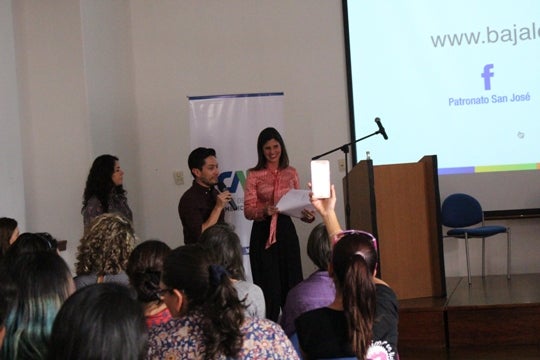Women in Quito ask for Stricter Sanctions to have a Safer Transport

Women's safety and security is compromised while using public transportation in developing countries. Most women have experienced situations of sexual advances or harassment, offenses, insults, or being involved in fights, and this is due to the under or overcrowding in transport units, according to the study Ella se mueve segura (She is able to move freely)
carried out by the Development Bank of Latin America (CAF) with the support of the Municipality of the Metropolitan District of Quito. They held the International Conference Ella se mueve segura (She is able to move freely) with the aim of sharing knowledge about the best practices in the region to promote public policies on inclusiveness and gender equality in sustainable transportation.
The study of the three cities that took part in the initiative (Quito, Santiago and Buenos Aires) was based on the methodology used in the publication Safe and Sound, International Research on Women's Personal Safety on Public Transport, carried out by FIA Foundation in March 2016. The first results showed that the personal safety of women is compromised while in public transport, and that the perception of insecurity can affect the way women use public transport to access education, employment, and health care.
In Quito, data from the Encuesta de Movilidad para el diseño del Metro de Quito (Mobility Survey for the design of the subway in Quito) identify that men make more trips per person (2.08) than women (1.86). However, women make more trips on foot and using public transport (64.4%) than men (58.8%). In the same vein, this research found, with the results from 1,145 surveys conducted in the Trolebus system corridor, that the main causes of insecurity in public transport are under or overcrowding, and the presence of street vendors in the units. The second cause is harassment, whether physical, verbal or visual. Also, nearly 50% of survey respondents reported having experienced sexual advances or harassment, while more than 60% reported having been victims of assault, robbery, fights or insults.
The study revealed that users believe that greater police control could help improve the situation and that stricter sanctions against those who breach the law are necessary to address the problem once and for all. Bernardo Requena, CAF Country Manager in Ecuador, explained the efforts made by the institution on sustainable mobility issues, which focus on users beyond the means of transport and/or infrastructure: “Our institution seeks to address the growing problem of gender-based insecurity in public transport in Latin America, and to research to what extent this phenomenon limits the incorporation of women into economic activities.”
Stakeholders at the municipal level (Passenger Transport Company (Empresa de Transporte de Pasajeros) and Municipal Board San José (Patronato Municipal San José)), provincial and national authorities in the areas of transport, public space and gender attended this event, as well as groups of women, who debated issues such as citizen perceptions of mobility habits, the challenge of improving the conditions of women in public transport at the national level, and how public organizations can work with the organized civil society.
In this way, CAF reinforces its commitment to sustainable development through different support and financing mechanisms for urban growth and transport as a fundamental basis in the dynamics of cities.
 Login
Login